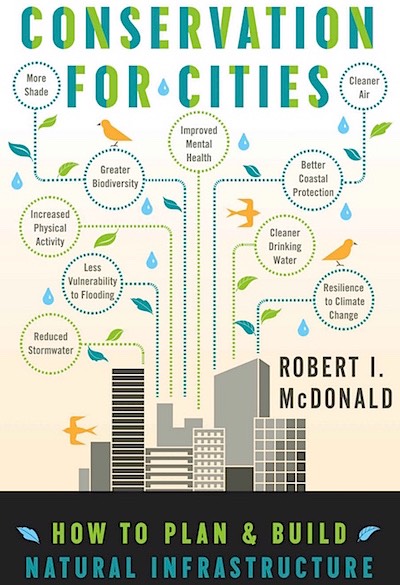Er is net een nieuw boek uit over Conservation for Cities: How to Plan & Build Natural Infrastructure. Natuurbehoud voor steden: Hoe een natuurlijke infrastructuur plannen en bouwen.

Vanzelfsprekend is dit Amerikaanse boek geschreven vanuit een marktvisie. De schrijver heeft het over ‘ecosystem services’, diensten van het ecosysteem voor de stad, en zijn categorisering van water als een privaat goed is op zijn minst nogal dubieus. Niettemin ziet hij de natuur en het behoud ervan als essentieel voor de moderne stad. Dus zeker de moeite waard om te lezen. Een must voor mensen als wethouder Choho en andere planologen. Het probleem in Nederland is dat ecologen ingekapseld in gemeentelijke besturen niet vrij zijn hun ecologische standpunten weer te geven vanuit een puur ecologisch standpunt, maar gedwongen worden om het beleid van de gemeente te ondersteunen. Anders lopen ze kans om ontslagen te worden.
Op dit moment dreunen de bassen van GaasperPleasure hier over de wijken van Gaasperdam. Ik denk dat dit een vorm is van verstedelijking van natuur die we niet zouden moeten wensen. Als evenementen dan toch bij een stad horen, dan wel in een stedelijke en liefst industriële omgeving en indoor; het is tenslotte een industrie met veel overlast.
GlobalPossibilities: ““The twenty-first century will be the fastest period of urban growth in human history,” says McDonald, who is also senior scientist for sustainable land use at the Nature Conservancy. Will this lead to a dystopian end of nature, as predicted by some conservationists? Or will we build cities that exist in co-harmony with nature? “If the city’s plans [to integrate natural infrastructure] are conducted, what is the cumulative effect? What will the city look like? What will it feel like to live in this greener, more resilient city?”
While these are some questions we can only fully answer in the future, McDonald gives us a practical manual for getting there. McDonald’s approach – using conservation for cities – is the product of a framework rooted in the concept of ecosystem services, the many benefits nature can provide us. This is in contrast to conservation in cities, which refers to protecting biodiversity in areas or urban growth; and conservation by cities, the act of making cities more efficient in resource-use and expenditure. Conservation for cities “aims to figure out how to use nature to make the lives of those in cities better. Rather than focusing on how to protect nature from cities, this book is about how to protect nature for cities.”
It’s McDonald’s hope that “rather than completely bending nature to our will, we could bend our will to match nature’s pathways, at least a little bit. The science of ecosystem services gives us some of the crucial tools to follow these other pathways, if we have the love to follow them.””
